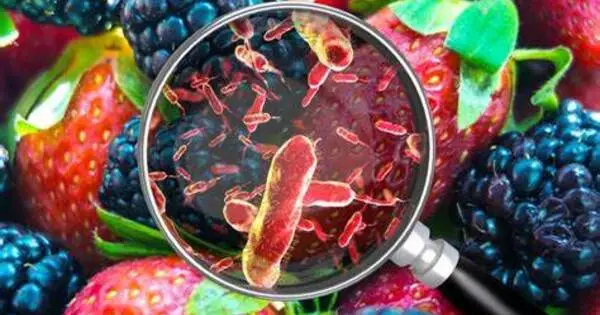Food poisoning, also known as foodborne illness, is a condition caused by the consumption of contaminated food or beverages. It is any illness caused by pathogenic bacteria, viruses, or parasites in food, as well as prions (the agents of mad cow disease) and toxins such as aflatoxins in peanuts, poisonous mushrooms, and various species of beans that have not been boiled for at least 10 minutes. Contamination can happen at any point during the food production process, including growing, harvesting, processing, storing, and preparing.
The contamination can result from bacteria, viruses, parasites, toxins, or chemicals. Bouts of vomiting can be repeated with an extended delay in between, because even if infected food was eliminated from the stomach in the first bout, microbes, like bacteria (if applicable), can pass through the stomach into the intestine and begin to multiply. Some types of microbes stay in the intestine.
Causes
Common causes of foodborne illnesses include:
- Bacteria: Salmonella, Escherichia coli (E. coli), Campylobacter, and Listeria are all bacteria that can contaminate food and cause illness. Bacteria can spread through improper food handling, inadequate cooking, and cross-contamination.
- Viruses: Viruses that can cause foodborne illnesses include norovirus and hepatitis A. These viruses can be spread by contaminated water, infected food handlers, or contaminated surfaces.
- Parasites: Giardia, Cryptosporidium, and Toxoplasma parasites can be transmitted through contaminated water or undercooked food.
- Toxins: Toxins can be produced by certain foods when they are contaminated or improperly stored. Botulism, which is caused by the bacterium Clostridium botulinum, and certain types of seafood poisoning caused by toxins produced by harmful algae are two examples.
- Chemicals: Contamination with harmful chemicals, such as pesticides, heavy metals, or industrial chemicals, can lead to foodborne illnesses.
Symptoms
Symptoms of foodborne illness can vary but often include nausea, vomiting, diarrhea, abdominal pain, fever, and other flu-like symptoms. In severe cases, foodborne illnesses can lead to dehydration, organ failure, and even death. Symptoms vary depending on the cause but often include vomiting, fever, and aches, and may include diarrhea.
Prevention
Preventing foodborne illnesses involves practicing good food hygiene and safety measures, including:
- Washing hands: Thoroughly washing hands before handling food can prevent the spread of bacteria and viruses.
- Cooking food thoroughly: Cooking food to the recommended internal temperature helps kill bacteria and parasites.
- Avoiding cross-contamination: Cross-contamination can be avoided by keeping raw meat, poultry, seafood, and their juices separate from ready-to-eat foods.
- Proper storage: Refrigerating perishable foods quickly and using them within a reasonable time frame aids in the prevention of the growth of harmful microorganisms.
- Avoiding risky foods: The consumption of raw or undercooked eggs, meat, seafood, and unpasteurized dairy products increases the risk of contamination.
Choosing reputable food suppliers and ensuring the safety of water sources help to prevent foodborne illnesses. It is critical to seek medical attention if someone develops symptoms of foodborne illness, especially if the symptoms are severe or prolonged.
















